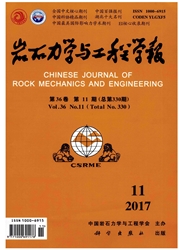

 中文摘要:
中文摘要:
通过在MTS815.03电液伺服岩石力学试验机上对焦作方庄煤矿煤层顶板粗砂岩进行高温后常规三轴压缩试验,基于试验结果研究不同温度作用后常规三向压缩条件下粗砂岩宏观力学特性,分析粗砂岩强度、平均模量、黏聚力、内摩擦角和极限应变与温度的关系;同时对粗砂岩强度、平均模量与围压关系进行探讨。研究结果表明,围压一定,温度为25℃~300℃时,随着温度的升高,试样的强度、平均模量、黏聚力、内摩擦角均逐渐增大,而变形模量有所降低。高温产生的热应力起到容纳变形和裂隙闭合作用,砂岩试件部分原生裂隙逐渐愈合,裂隙数量减少,密实程度提高,矿物颗粒间接触关系得到改善,摩擦特性得以增强;超过300℃以后,随着温度的升高,粗砂岩试样的强度、平均模量、黏聚力、内摩擦角均有所减小,而峰值变形逐渐增大,由高温引起的粗砂岩矿物颗粒的不同热膨胀率导致跨颗粒边界的热膨胀不协调,从而产生结构热应力使试样内部产生微裂隙,试样承载能力和抗变形能力减弱。而围压对粗砂岩的力学性质起到改善和强化作用,当温度一定时,随着围压的升高,粗砂岩试件强度、平均模量、黏聚力、内摩擦角均逐渐增大。
 英文摘要:
英文摘要:
Experiments are carried out to study coarse sandstone on upper plane of coal bed of Fangzhuang Coal Mine of Jiaozuo Co., Ltd. under conventional triaxial compression by the MTS815.03 servo-controlled testing machine after high temperature. Based on the experimental results, the macro-mechanical properties of coarse sandstone under conventional triaxial compression after different temperatures are investigated. The relationships between triaxial compression strength, average modulus, cohesion, internal friction angle and peak strain of coarse sandstone and temperature are analyzed; and those between strength, average modulus and temperature are also studied. The results show that, when the confining pressure imposed on coarse sandstone is constant, and the temperature changes from 25 ℃ to 300 ℃, with the increasing of the temperature, the triaxial compression strength, average modulus, cohesion, internal friction angle all gradually increase, but the peak strain has a slightly decrease. The thermal stress generated by high temperature has an effect of absorbing deformation and closure of fracture, parts of the original fracture get close; the number of fractures decreases; the compaction rate uprates; the contact relationship of mineral grain has been improved; and the frictional characteristic has been enhanced. When the temperature is over 300 ℃, with the increase of temperature, the triaxial compression strength, average modulus, cohesion, internal friction angle all decrease; but the peak strain has a little increase. And the discordant thermal expansion which happens across mineral particles can induce structural thermal stress due to the different thermal expansion coefficients of mineral particles in coarse sandstone. Then the microcracks develop inside the sample which makes the bearing capacity and non-deformability decrease. And the confining pressure can improve the mechanical properties of coarse sandstone. When the temperature is internal, with the increase of confining pressure, the strength, a
 同期刊论文项目
同期刊论文项目
 同项目期刊论文
同项目期刊论文
 Test analysis of deformation characteristics and compressive strengths of two types of coal specimen
Test analysis of deformation characteristics and compressive strengths of two types of coal specimen Photo-elastic experimental and field measurement study of ground pressure of surrounding rock of lar
Photo-elastic experimental and field measurement study of ground pressure of surrounding rock of lar Test study of gas seepage characteristics of gas-bearing coal specimen during process of deformation
Test study of gas seepage characteristics of gas-bearing coal specimen during process of deformation Experimental study of gas permeability of outburst coal briquettes in complete stress-strain process
Experimental study of gas permeability of outburst coal briquettes in complete stress-strain process In-situ experimental study on the relation of drilling cuttings weight to ground pressure and gas pr
In-situ experimental study on the relation of drilling cuttings weight to ground pressure and gas pr Test study on coupling relationship between permeability characteristics and stress of outburst coal
Test study on coupling relationship between permeability characteristics and stress of outburst coal Experimental study of influence of confining pressure unloading speed on mechanical properties and g
Experimental study of influence of confining pressure unloading speed on mechanical properties and g Experiment of deformation property and gas permeation of containing-gas coal under confining pressur
Experiment of deformation property and gas permeation of containing-gas coal under confining pressur 期刊信息
期刊信息
